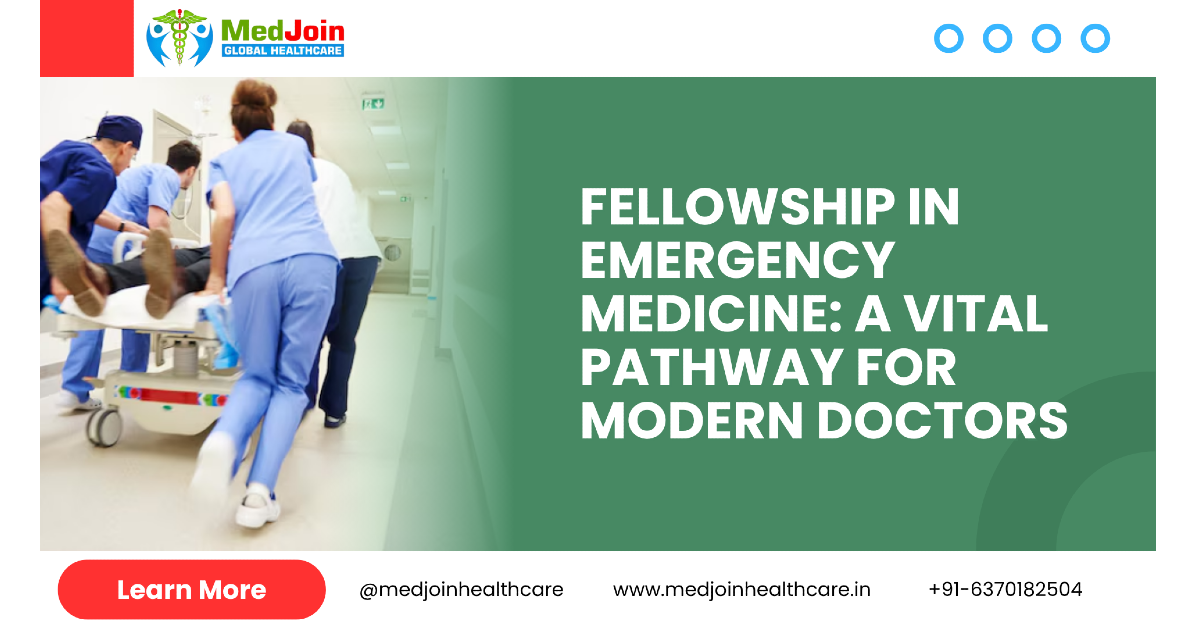
In today’s fast-paced healthcare landscape, the need for highly skilled emergency physicians is more critical than ever. Emergency medicine is the frontline of modern healthcare—handling life-and-death situations, managing trauma, and providing immediate care to patients in critical condition. A Fellowship in Emergency Medicine empowers doctors with the practical knowledge, advanced skills, and confidence to thrive in this demanding yet rewarding specialty.
Whether you're a recent MBBS graduate, a general practitioner, or a healthcare professional looking to upskill, this blog explores everything you need to know about a Fellowship in Emergency Medicine —its scope, benefits, curriculum, eligibility, and how it can be a transformative step in your medical career.
What is a Fellowship in Emergency Medicine?
A Fellowship in Emergency Medicine (FEM) is a structured, advanced training program designed to equip doctors with in-depth expertise in handling emergency medical situations. It bridges the gap between theoretical knowledge and real-world clinical emergencies. The program typically lasts 1–2 years and covers core areas like:
- Advanced Cardiac Life Support (ACLS)
- Trauma and injury management
- Acute care diagnostics
- Poisoning and toxicology
- Disaster and mass casualty handling
- Emergency surgical procedures
- Emergency imaging and investigations
With hands-on training, simulations, and supervised practice, fellows become adept at making quick, accurate decisions under pressure—an essential trait for emergency physicians.
Why Emergency Medicine Matters in Today's World
Emergency departments are the safety net of healthcare. Whether it's a road traffic accident, heart attack, stroke, or an unconscious patient with unknown causes, emergency physicians are often the first responders. Their ability to stabilize patients, initiate critical interventions, and coordinate care determines patient outcomes in many cases.
The rise in chronic illnesses, accidents, and global health emergencies like the COVID-19 pandemic has highlighted the urgent need for specialized emergency care. Trained emergency doctors help reduce mortality, alleviate overcrowded hospitals, and improve patient satisfaction and system efficiency.
Who Should Enroll in the Fellowship?
The Fellowship in Emergency Medicine is ideal for:
- MBBS graduates seeking specialization or career direction
- General practitioners handling emergencies in clinics or primary care settings
- ICU or casualty doctors wanting to enhance their emergency response capabilities
- Doctors preparing for international exams like PLAB, USMLE, or MRCP
- Medical officers in rural or semi-urban areas where emergency care is often lacking
It’s also valuable for those who work in military healthcare, ambulance services, or disaster response teams.
Core Objectives of the Fellowship
The fellowship aims to:
- Develop rapid clinical decision-making skills
- Improve competence in airway management, resuscitation, and trauma care
- Familiarize doctors with the emergency protocols and triaging systems
- Train in multi-specialty emergency coordination (pediatrics, neurology, surgery)
- Enhance communication skills for high-pressure environments
Ultimately, the fellowship helps mold doctors into confident, efficient emergency physicians ready to handle any medical crisis.
Curriculum Overview
Though specifics may vary across institutions, a typical Fellowship in Emergency Medicine covers the following modules:
1. Fundamentals of Emergency Medicine
- Emergency department workflow
- Triage and initial assessment
- Legal and ethical issues in emergencies
2. Advanced Life Support
- Basic Life Support (BLS)
- Advanced Cardiac Life Support (ACLS)
- Pediatric Advanced Life Support (PALS)
- Neonatal resuscitation protocols
3. Trauma and Injury Management
- Road traffic accidents, head injuries
- Fracture stabilization, spinal injury protocols
- Burns and wound management
4. Medical and Surgical Emergencies
- Cardiovascular: heart attacks, arrhythmias
- Respiratory: asthma, COPD exacerbation
- Neurological: seizures, stroke management
- GI: bleeding, pancreatitis, hepatic failure
5. Poisoning and Toxicology
- Common poisons and overdose management
- Snake bites, scorpion stings, organophosphate poisoning
6. Disaster and Mass Casualty Handling
- Triage in disaster settings
- Crisis management and coordination
7. Diagnostic and Imaging Skills
- Point-of-care ultrasound (POCUS)
- ECG interpretation
- X-ray and CT in emergency settings
8. Soft Skills and Communication
- Breaking bad news
- Handling aggression and panic
- Patient and family counseling
Most programs also include case discussions, research projects, online modules, and hands-on hospital training.
Benefits of Pursuing a Fellowship in Emergency Medicine
1. Enhanced Clinical Competency
Gain specialized, hands-on training that goes beyond what is taught in MBBS or general practice. Fellows learn to manage emergencies independently and effectively.
2. Career Advancement
Whether in India or abroad, trained emergency physicians are in high demand. Hospitals, trauma centers, urgent care units, cruise liners, and air ambulances all seek such expertise.
3. International Recognition
Many fellowships follow global standards (like AHA or RCEM protocols), enabling doctors to explore international opportunities or clear licensing exams.
4. High Impact Role
Emergency medicine is a calling for those who want to make an immediate difference in patients’ lives. You save lives every day—often in the nick of time.
5. Versatile Career Options
Emergency medicine opens doors in:
- Hospital emergency departments
- Government health missions
- NGOs and disaster relief organizations
- Teaching and training
- Tele-emergency services
How to Choose the Right Fellowship Program
Not all fellowships are equal. Here’s how to pick the best one:
- Accreditation: Is it recognized by reputed medical bodies?
- Curriculum: Is it comprehensive and practice-oriented?
- Faculty: Are the trainers experienced emergency physicians?
- Clinical Exposure: Will you work in busy emergency departments?
- Flexibility: Does it offer part-time/online options for working doctors?
- Certification: Will you get international life support certifications?
Programs like those offered by MedJoin Global, CMC Vellore, or international boards are well-reputed for quality emergency training.
Duration, Eligibility & Mode of Learning
Duration: 1 year (can vary between 6 months to 2 years)
Eligibility:
- MBBS or equivalent recognized medical degree
- Registration with Medical Council of India or respective state council
Mode:
- Full-time residential
- Part-time with weekend contact classes
- Online hybrid with simulation and practical sessions
Programs today cater to diverse learners—from fresh graduates to working professionals.
Real-Life Impact: A Day in the Life of an Emergency Medicine Fellow
Dr. Neha Sharma, an MBBS graduate from Delhi, joined a Fellowship in Emergency Medicine in 2025. Within weeks of training, she was confidently managing seizure patients, trauma cases, and cardiac arrests under supervision.
"The fellowship changed my perspective. I used to panic during emergencies. Now, I assess, act, and stabilize. The hands-on mentorship and simulations helped me gain real-world confidence." — Dr. Neha
Career Opportunities After Fellowship
Graduates can explore roles such as:
- Emergency Medicine Consultant
- Casualty Medical Officer
- Trauma Team Leader
- Flight Doctor for Air Ambulance
- ICU/ER Instructor for Academic Institutions
- NGO/Red Cross Emergency Field Officer
With healthcare expansion and increased patient loads, hospitals actively seek skilled ER professionals. Many institutions offer attractive salary packages, leadership roles, and fast-track career growth to fellowship-trained doctors.
Future of Emergency Medicine in India
India is witnessing a growing recognition of emergency medicine as a core specialty. The National Medical Commission (NMC) has initiated dedicated postgraduate programs (MD Emergency Medicine), but there’s still a vast gap in trained professionals.
Fellowship programs serve as a vital bridge to build capacity, especially in tier 2 and rural settings where emergency services are sparse. As healthcare infrastructure improves, so will the demand for trained ER physicians. Tele-emergency and AI-assisted diagnostics will also evolve this field further.
Final Thoughts: Is This Fellowship Right for You?
If you thrive in high-pressure situations, love challenges, and are driven by the desire to save lives—a Fellowship in Emergency Medicine could be your perfect fit. It is a career that brings adrenaline, responsibility, and immense professional satisfaction.
With the right training, you won’t just react to emergencies—you’ll lead them with clarity, speed, and clinical precision.
Ready to Take the Leap?
Explore fellowship opportunities with reputed medical education providers like MedJoin Global, GlobalMed Academy, or online-accredited programs that blend flexibility with impact. Make sure to review curriculum, trainers, clinical tie-ups, and certification outcomes.
Don’t wait for the right moment. In emergency medicine, every second counts—so does every step in your career.






